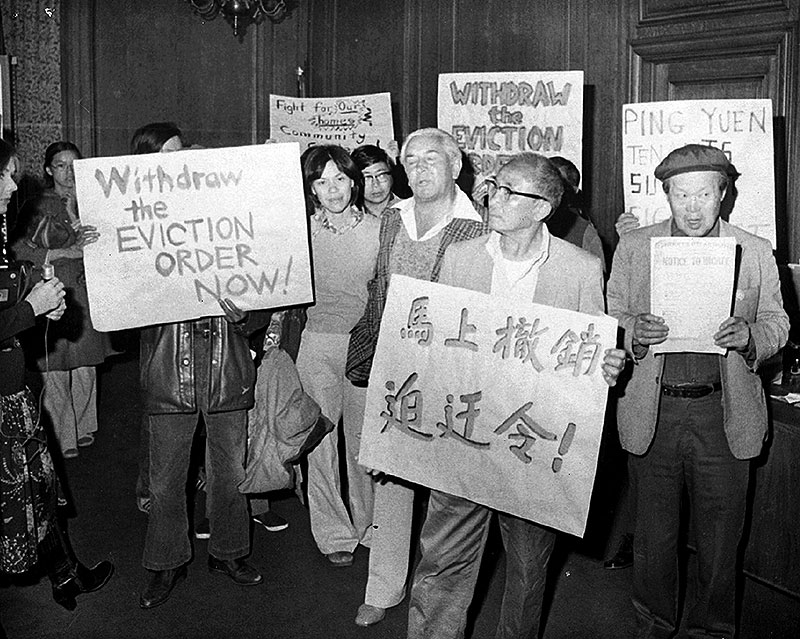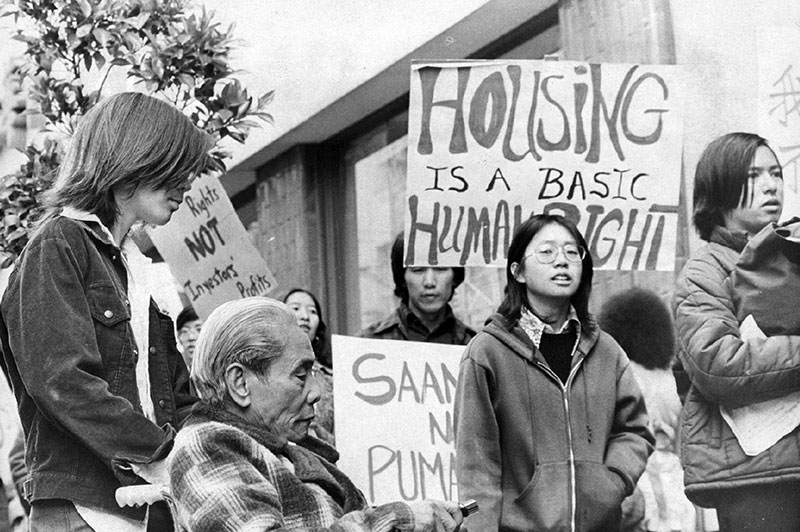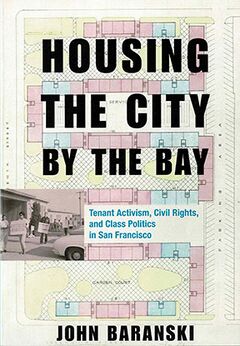San Francisco Housing Authority Tries to Buy I-Hotel
Historical Essay
by John Baranski
This excerpt originally appeared in "All Housing is Public," Chapter Seven of Housing the City by the Bay: Tenant Activism, Civil Rights, and Class Politics in San Francisco (see below for copyright and book information)
Anti-eviction protest at the International Hotel, 1976.
Photo: Bancroft Library
San Francisco residents in and out of public housing counted on the San Francisco Housing Authority (SFHA) for their housing and community needs. The battle over the International Hotel symbolized this relationship. Located at Kearny and Jackson Streets, the International Hotel was home to mostly elderly Chinese and Filipino tenants and was the cornerstone of the Filipino community. After the Hong Kong-based Four Seas Corporation bought the hotel in 1973, the tenants received eviction notices. Rather than give up their homes and community, residents and their allies fought back in a collective rejection of private property rights. A coalition of organizations—including the May First Workers Organization, Ping Yuen Resident Improvement Association, Jones’s Peoples Temple, and the Kearny Street Workshop artist collective—launched waves of protests with colorful pickets that stretched for blocks and drew national attention.(17)
Tenants had widespread support from the city government, even from Sheriff Richard Hongisto. When the Four Seas Corporation refused to stop the evictions, residents and city leaders proposed that the SFHA buy and then manage the hotel. At one of many packed SFHA Commission meetings on this proposal, Vernon Baun of the May First Workers Organization said support for these tenants came from the idea that “working people built this country and yet, ‘when we are old we are no longer important.’” He said the “matter had become a symbol throughout the country and the Bay Area” and that “we are going to continue to organize. It is our class against parasites like the Four Seas.”(18)
Protest outside the I-Hotel, demanding housing as a human right.
Photo: Bancroft Library
The SFHA officials began work on several proposals to buy the hotel. They also made available bilingual staff and housing for some tenants, though the government homes that were provided dispersed elderly tenants across the city and away from the International Hotel community. The SFHA leaders did make an offer to purchase the hotel, but their efforts failed because the offer proved too costly and legally complicated to execute.(19)
previous article • continue reading
Notes
17. Estella Habal, San Francisco’s International Hotel: Mobilizing the Filipino American Community in the Anti-Eviction Movement (Philadelphia: Temple University Press, 2007).
18. Ibid.; quote in SFHA, Minutes (December 23, 1976).
19. SFHA leaders and nearly all tenants favored buying the International Hotel, though a few tenants noted that this would take resources from their projects. See SFHA, Minutes (1974–1978). In 1994, HUD and the mayor’s office funded low-income senior housing and a Manilatown Center on the former International Hotel land. See Habal, San Francisco’s International Hotel. For the senior movement, see Paul Kleyman, Senior Power: Growing Old Rebelliously (San Francisco: Glide Publications, 1974); Roger Sanjek, Gray Panthers (Philadelphia: University of Pennsylvania Press, 2011).
Excerpted from Housing the City by the Bay: Tenant Activism, Civil Rights, and Class Politics in San Francisco by John Baranski, published by Stanford University Press. Used by permission. © Copyright 2019 by John Baranski. All rights reserved.



